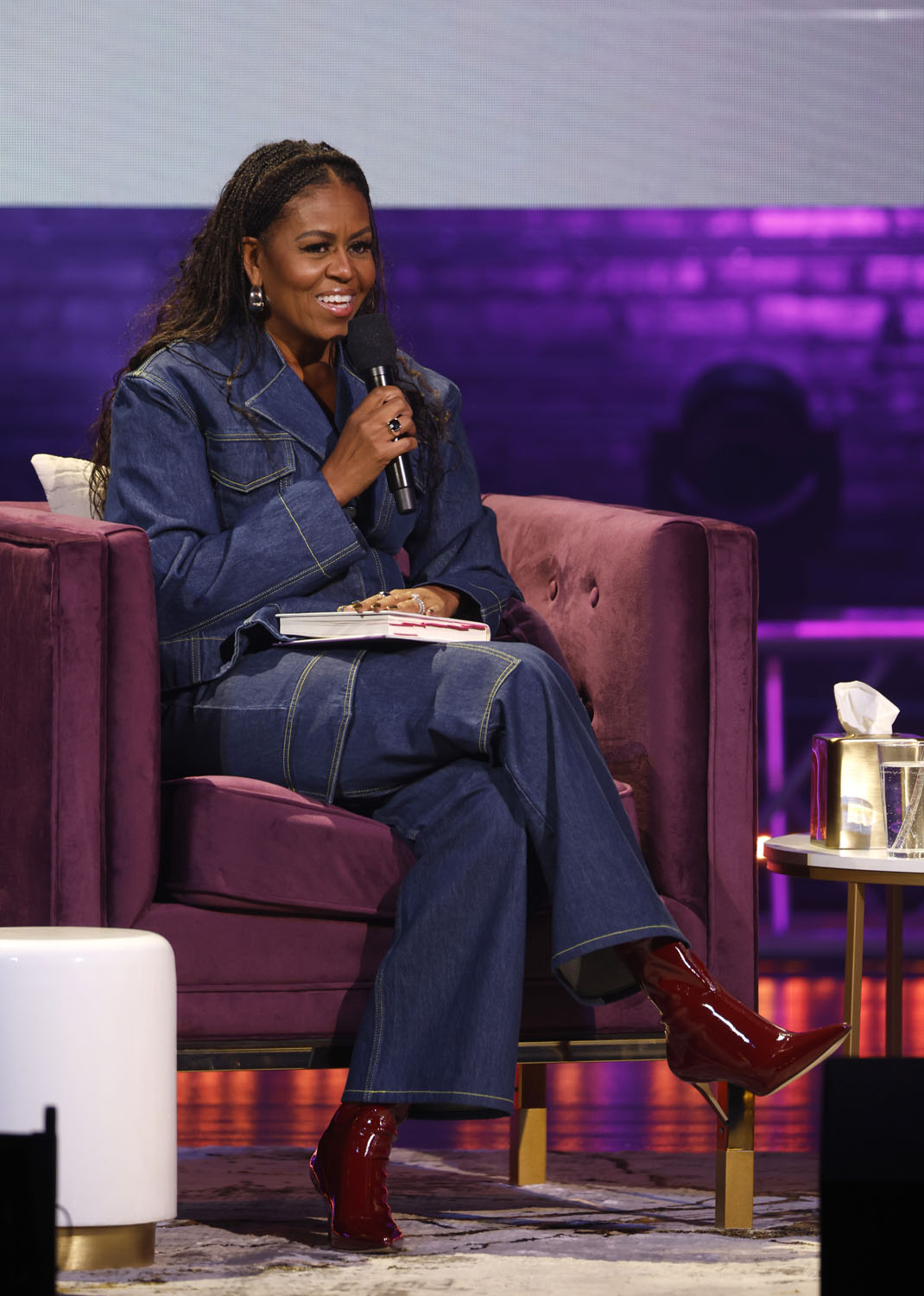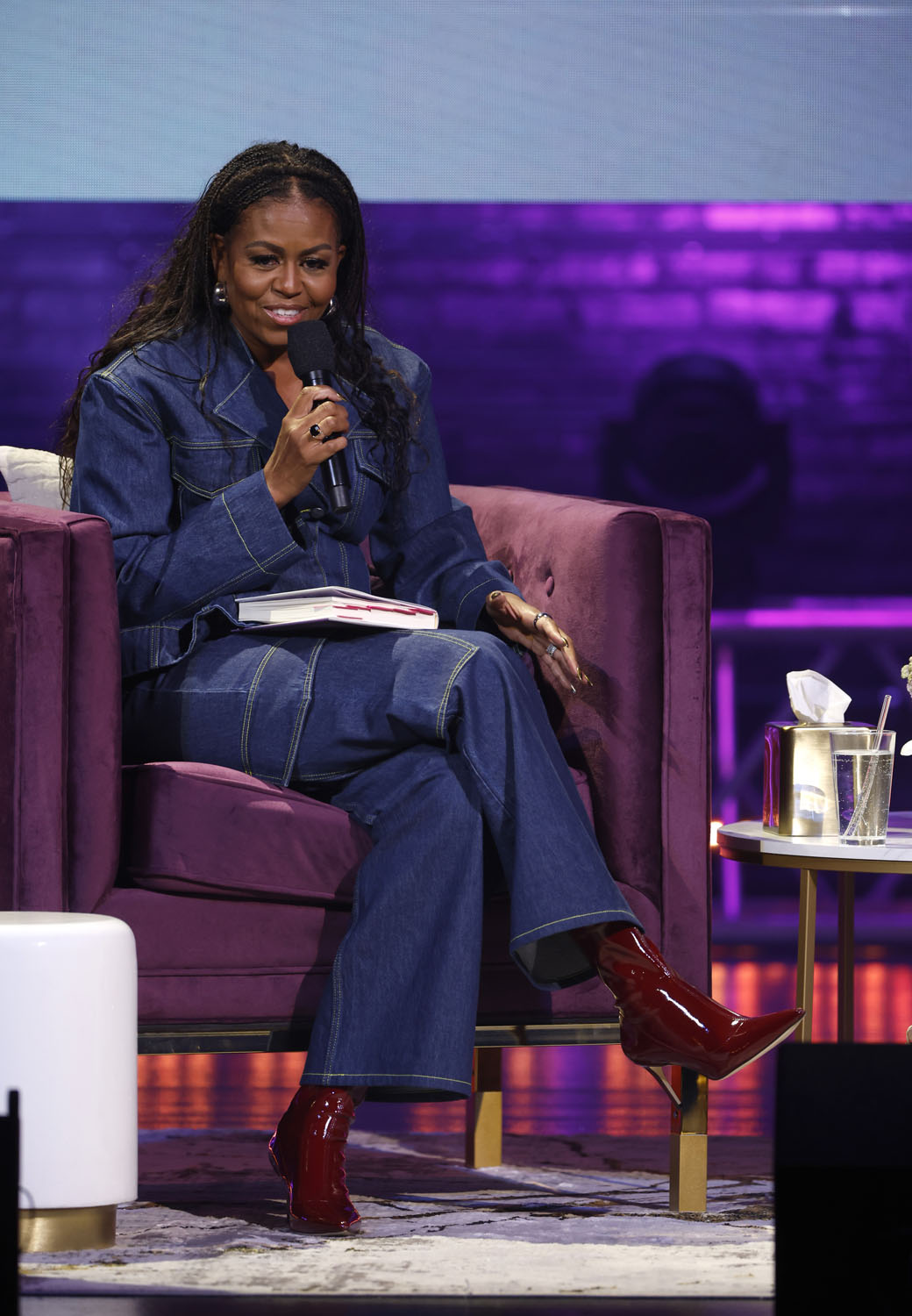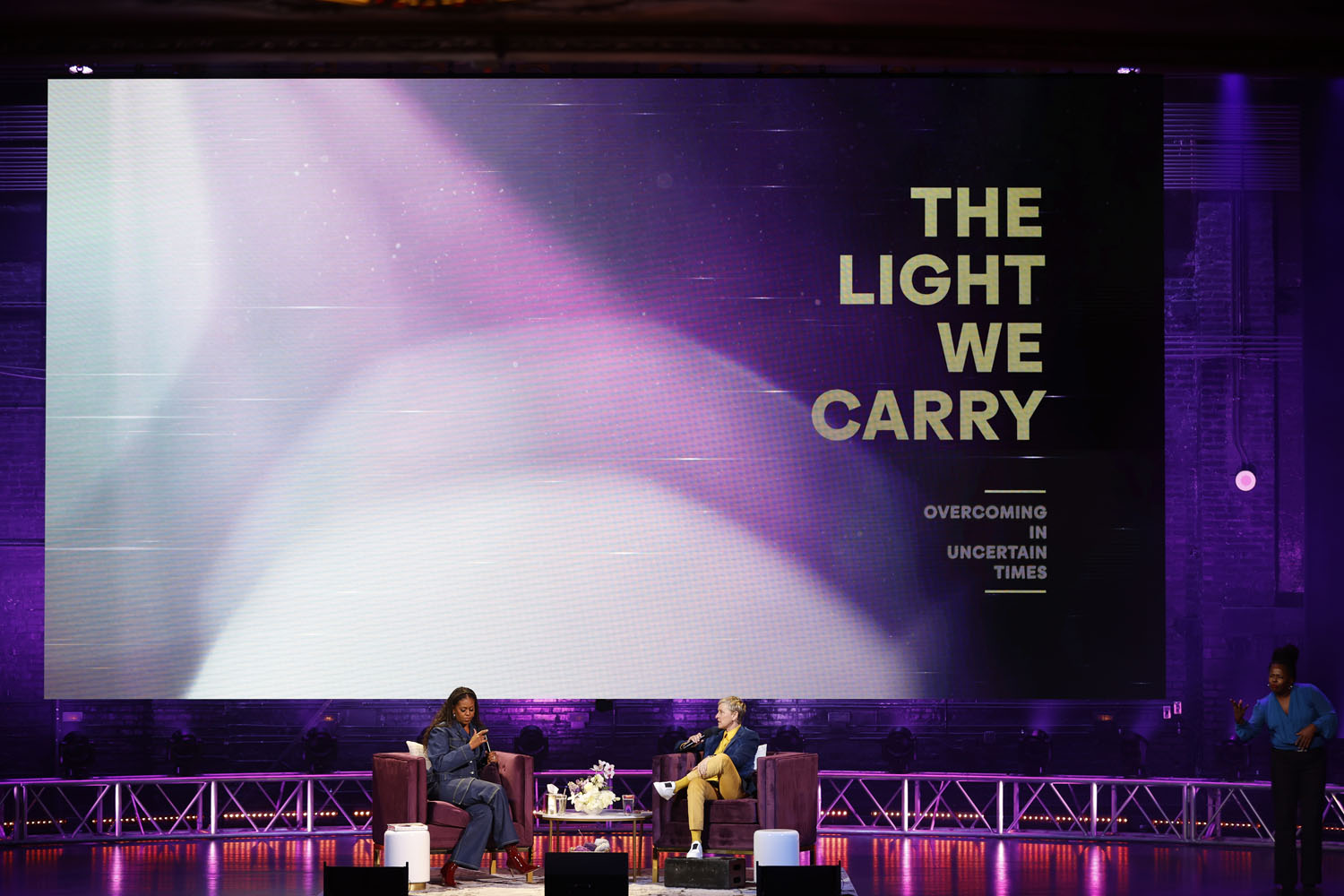Michelle Obama on Relationships



Michelle Obama has been doing some serious press for the release of her new book, The Light We Carry. As expected, our favourite former First Lady is dropping gems of knowledge and sharing some of the insights and wisdom she’s acquired throughout her life. And while, for the most part, all of her appearances and interviews have left people feeling inspired and uplifted, I couldn’t totally connect with her thoughts about marriage and partnership that she shared during a chat with NPR.
In conversation with Juana Summers, she described what she calls her “philosophy” and “outlook” on marriage, suggesting young people give up on their relationships too quickly these days – and that perhaps we lack a full understanding of what marriage truly is.
“If I look over my marriage, if I were to judge it in year five or year ten, there was never 50/50. Someone was always giving way more, someone always needed a different kind of thing,” she said. “You have to evolve with it. There were times where I felt I was 70% in and he was doing 30%. I’ve had to compromise, as he has.”
She also described having to make sacrifices in her career, saying “I had to take my foot off of my career gas pedal. Never taking my foot off completely, but slowing.”
I think both of these ideas are ones a lot of women can relate to – whether they’ve been married or not. Women take on an incredible amount of invisible labour in their relationships, even long before there is an engagement or discussion of marriage. Women often serve as the primary social organizers in relationships, seeing to it that appointments, recitals, dinners and events are marked in calendars and attended. And if these events require gifts or cards of any sort, I’d bet my last dollar that the woman is the one to pick, buy, wrap, and sign it.
It’s happened to me. Many times. I’ve never been engaged or married but I’ve had a few serious relationships and it always shocks me how gradually, yet suddenly, I become a secretary or receptionist, the appointment-maker, and the administrative assistant who knows where all the important documents are.
It’s not to say Michelle Obama is wrong in her assertion that people are giving up on their relationships. The United States has the sixth highest divorce rate in the world – with 40%-50% of married couples filing for divorce. But when you consider that the number is even higher for couples in their second and third marriages and that baby boomers have the highest divorce rate at nearly 35%, perhaps Michelle is wrong about this being an issue of young people giving up. And perhaps the problem is the institution of marriage itself.
In terms of who files for divorce, it’s mostly women: 69% of women, compared to just 31% of men initiate their divorces. And I can’t say I blame them. Historically, marriage has been a tool for success and happiness for men, while it can have an entirely different effect on the lives of women.
In 1972, a sociologist Jessie Bernard published a book called The Future of Marriage. In it, she introduced the revolutionary idea that within a marriage, there were two separate experiences happening. She called it “his and hers marriages” and suggested his was likely happier. Since then, there have been thousands of studies about marriage – and for the most part, Bernard’s ideas still hold up.
Studies have shown neither men nor women become happier after they get married. There was an indication that both become more satisfied with life around the time of their wedding, but after a period of time, their satisfaction, or dissatisfaction, goes back to what it was when they were single. Studies also show that men and women become more and more dissatisfied with their relationships over time, with women becoming dissatisfied sooner. Perhaps that’s why women are the ones initiating divorces – or as Michelle puts it, giving up.
“I feel bad when I see young people giving up on their relationship. Because there are periods of hard. There are periods of discomfort,” she said. “As I have told young people who ask me about marriage, you have to be prepared to have long stretches of discomfort. And long, I mean it could last for years. And don’t put kids into the equation because that’s just another layer of complication.”
My question is - how are women supposed to process all of this? Some of us feel incredibly pressured by society and our families to find a partner, get engaged, get married and start popping kids out before it’s “too late”. But at the same time, we’re supposed to spend what could be years on end in an unequal and unfair relationship, not yet introducing kids into the mix because it can “complicate” things. All the while trying to establish ourselves in our careers and earn high-paying jobs in an economy that always seems like it is on the verge of a global collapse. Do I have that right?
The thing is, Michelle found Barack Obama. She struck gold. She’s not out here in the same dating streets that the rest of us are, where there are incels, people addicted to playing video games in their mom’s basements, people with a history of narcissistic tendencies, or maybe children they haven’t told you about (this did in fact happen to me a few years ago). So while her advice might be sound for women who have genuinely good men in their orbit, by the time most of us are done sifting through absolute garbage, we make the conscious choice to focus on ourselves and our careers and go to yoga on Saturdays instead of making pancakes and bacon for our sports-watching dude bro eating last night’s popcorn off his chest.
I want to be clear in saying it’s not just a lack of selection that has women opting to leave their relationships or just stay single entirely. The role men played as some necessary component to have a child is no longer the case. There is so much more medical intervention available for women who want to be mothers, but perhaps do not have a male partner to assist. Women are more capable than ever to go it alone.
Speaking of going it alone, that in itself is something that’s been weaponized against women. For decades, and even today, the idea of “growing old and alone” is seen as this awful, undesirable thing. This Twitter user recently went viral (for all the wrong reasons) after tweeting that her mom “needs a man” and that growing old and alone is “not a pretty sight to see.” But according to research, growing old isn’t synonymous with growing alone.
Whereas men do their best living with someone, in most cases, a wife, women actually do better living alone. One reason is because they have time for their own hobbies and interests, something men still manage to make time for even living with a partner. Research suggests that women are always more satisfied with the number of friends they have, regardless of their living situation. But when it comes to living alone, 71% of women, compared to just 48% of men are satisfied with the number of friends they have.
In terms of why, we don’t have the answer quite yet, but here’s what the research suggests:
“One possibility is that by living alone instead of with a husband and children, women are liberated from traditional roles and expectations. They are no longer the short-order cook, the cleaner, and the laundress for a family. They are freed of the emotional work of shoring up egos and soothing bruised feelings. They don’t have to account to someone else for the money they spend. They also learn how to do the kinds of things that husbands traditionally did—or they find someone else to hire or help.”
And lastly, women are thought to enjoy their solitude more than men. Every single time I have left a relationship, I’ve read more books, I’ve done more journaling without the fear that some nosey and insecure douche might read my inner thoughts and feel as if they were a personal attack. I’ve eaten healthier, earned more promotions, spent more time with my friends, travelled, attended more social events, enjoyed more shows and documentaries, and felt less pressure to have to perform in every realm from the kitchen to the bedroom.
Going back to what Michelle said about young people “giving up”, we have to be careful about how we speak when it comes to perceived successes and failure. I mentioned a game-changing podcast in my recent piece about EmRata, where former professional poker player and author Annie Duke described all of the amazing verbiage we use to describe people who don’t quit. We use words like persistent, resilient, determined and a bunch of others that glamourize sticking it out. But when people honour their boundaries, when people abide by their turnaround times, they’re referred to as quitters, or people who give up.
Tia Mowry, who recently announced her and Cory Hardrict’s divorce, has reframed her thoughts on marriage and what makes one successful, and not only has she changed her outlook, she’s changed the way she speaks about her marriage and the dissolution of it, not as a failure, but a success. She called her divorce a celebration, suggesting her marriage allowed her to learn, evolve and create.
"I was able to create with Cory some beautiful, amazing children," she added. "Now, there's a celebration. So that's basically how I'm looking at it now,” she said on The Today Show. “And I feel like people, when they look at marriage, that success equals longevity, but no. At the end of the day are they happy? Are they thriving? Are they growing? I feel like that is what is most important."
Michelle Obama seems to think that a sense of urgency may be behind our lack of desire to “stick it out”.
“In this age of ‘we want everything now we want everything quick, when everything in life is but that, we have to understand that marriage is never 50/50. You wonder how that idea got out there,” Michelle said.
I don’t wonder how that idea got out there. I think it stems directly from the fact that for decades, people were getting married, owning homes and having boat loads of kids by age 30. It’s not feasible anymore. It’s not affordable. And quite frankly, it’s not desirable for everyone anymore. Women have come to recognize all of the amazing things life has to offer just outside the narrow scope society has provided to us and I’m not sure we’re looking back.





